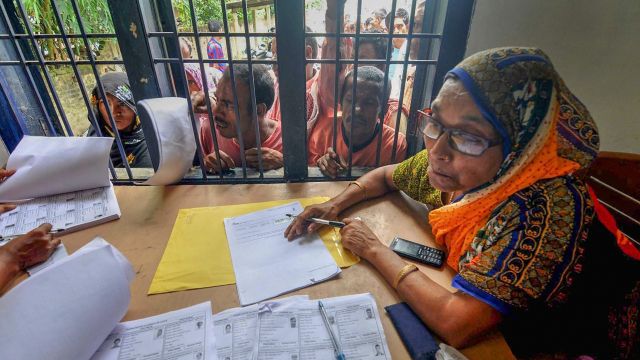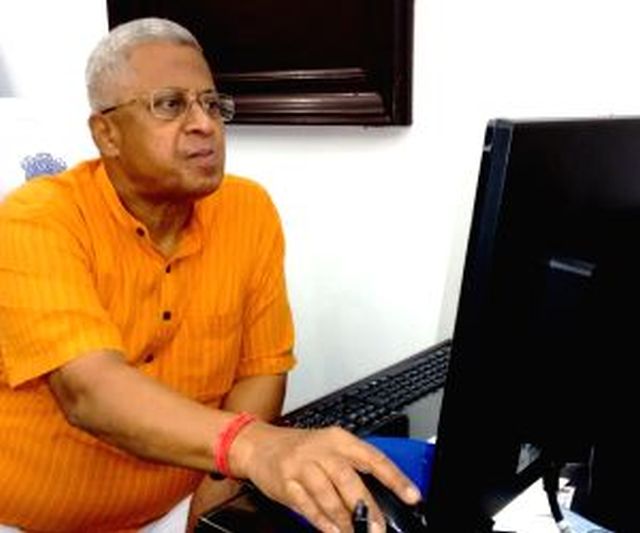
by admin | May 25, 2021 | Opinions
 By Amulya Ganguli,
By Amulya Ganguli,
Ever since the former saffron stalwart, Arun Shourie, created a stir in the 1980s with his articles on illegal immigrants in Assam comprising Bangladeshi Muslims, the Bharatiya Janata Party (BJP) has seen the issue as an excellent one to furbish its nationalist credentials by portraying the “aliens” as a security threat. The depiction also fitted in with the party’s anti-Muslim worldview.
The latest row over the National Register of Citizens (NRC) in the state can be regarded, therefore, as a continuation of the anti-foreigner agitation conducted by the All Assam Student Union (AASU) the 1980s although the lead has been taken this time by the BJP while its ally in the state government, the Asom Gana Parishad (AGP), which is the AASU’s successor, is maintaining a low profile.
However, a solution to the problem of “foreigners” is not simple. Since Assam has long been a province of immigrants with the tea plantation labourers having been brought in from the tribal areas in Bihar by the colonial rulers and the “hardy” peasants of East Bengal being encouraged to settle down in the state in the pre-partition period to cultivate land, Assam has become a mosaic of various communities, including its own tribals.
Untangling the medley of the diverse ethnic groups is fraught, therefore, with the likelihood of creating tension leading to violence although Mamata Banerjee’s outbursts about a “civil war” and a “bloodbath” are an overstatement. Her objective is obviously to consolidate her own pro-Muslim and “liberal” supporters in West Bengal and elsewhere in the context of her prime ministerial ambitions.
However, it is the near-certainty of a volatile outcome of the detection and deportation of the “foreigners” mandated by the Assam accord of 1985 which has come in the way of implementing the central point of the agreement. This “failure” was not so much the result of the Congress’s “appeasement” of Muslims, as the BJP alleges, as the need to proceed with caution.
The same advice is now being given by the Supreme Court, under whose aegis the enumeration of the citizens is being conducted. Union Home Minister Rajnath Singh, too, has been favouring circumspection with the assurance that all opportunities will be given to the four million people excluded from the NRC to prove their bona fides.
In contrast, BJP president Amit Shah has virtually disenfranchised the four million by dubbing them “ghuspetias” (infiltrators) while the Advocate General has told the Supreme Court that their biometric details will be collected so that they may not settle down in other states. What is more, the BJP leaders are talking in terms of similar headcounts in other states, especially West Bengal, which is believed to harbour a substantial number of Bangladeshi infiltrators.
It appears, therefore, that even before the NRC’s final report has been prepared, the BJP is seeing the exercise as a means of raising the fear of the nation being overrun by aliens. The party evidently believes that such charges will help it in the forthcoming elections while its opponents seem to believe that the fear will make the minorities support the “secular” parties. To both the groups, the hapless individuals are nothing but electoral fodder.
On the other hand, there is no sign that the BJP is willing to recognise the difficulty of weeding out the illegals from the other citizens without creating a social upheaval. The task is made all the more difficult by the problem of distinguishing the Muslims of Bangladesh from the Muslims of Assam since there is little difference between them about their dialect and lifestyle, especially when the paper documents are not always reliable even where they are available.
To make matters worse, the focus of the authorities on those who speak Bengali tends to frighten even the Bengali Hindus in view of the fact that there had been a series of anti-Bengali riots in Assam in the 1960s. Not surprisingly, a section of the Bengali Hindus fled to West Bengal in search of safety during the anti-foreigner agitation of 1979-85.
The BJP also pays no heed to Bangladesh’s summary rejection of the possibility of accepting those whom India will like to evict since such an admission will detract from its political propaganda.
Yet, since the presence of the “aliens” cannot be wished away, a group of ministers (GoM) under the chairmanship of then Home Minister L.K. Advani had proposed in 2001 that they be given work permits, which will be their only valid document. As such, they will not be able to vote and cannot constitute the “vote bank” of any party.
Since illegal immigrants stoke the xenophobia of “nationalist” parties, it is a card which they are reluctant to forsake. It is not in India alone that the card is played. The compulsions are the same in Donald Trump’s America and among pro-Brexit Britons, not to mention the far right parties in Europe. The NRC controversy is likely to persist, therefore, at least till the 2019 general election.
(Amulya Ganguli is a political analyst. The views expressed are personal. He can be reached at amulyaganguli@gmail.com )
—IANS

by admin | May 25, 2021 | Corporate Jobs, Employment, Government Jobs, News, Overseas, Politics, Private Jobs

Tripura Governor Tathagata Roy
Agartala : People who flee their countries due to genuine fear of persecution are refugees while those entering another country in search of employment or economic opportunities are infiltrators, the Tripura Governor said on Tuesday.
In a series of tweets on the National Register of Citizens (NRC) draft in Assam, Tathagata Roy said: “Only those who flee their countries because of genuine fear of persecution because of religion, ethnicity, political belief are refugees. People entering another country in search of employment or economic opportunities are not refugees. They are infiltrators.”
Roy, who came here on Tuesday evening from Kolkata, also said that those howling about the exclusion of people from the Assam NRC were advised to read the definition of the word ‘refugee’ given by UNHCR.
“Any old person crossing from his country to another is not a refugee.
“As per UNHCR definition, which, for some reason, is still not formally accepted by the Indian government, Hindus, Sikhs, Christians and Buddhists fleeing Bangladesh and Pakistan are refugees.
“Muslims entering India are not refugees because they faced no persecution in their home countries,” said Roy, a former President of the Bharatiya Janata Party in West Bengal.
Over 40 lakh of the 3.29 crore applicants have been excluded from Assam’s draft NRC released on Monday, sparking concerns about their future.
—IANS

by admin | May 25, 2021 | News, Politics
 Guwahati : Over 40 lakh of the 3.29 crore applicants have been excluded from Assam’s draft National Register of Citizens (NRC) released on Monday, sparking concerns about their future and triggering a nationwide political row.
Guwahati : Over 40 lakh of the 3.29 crore applicants have been excluded from Assam’s draft National Register of Citizens (NRC) released on Monday, sparking concerns about their future and triggering a nationwide political row.
Applications of 2.89 crore have been approved in the draft list of citizens, which forms part of a long-running campaign against Bangladeshi immigrants in Assam.
As the controversy over denying citizenship to 40 lakh applicants brewed, the central government urged people not to panic and asked the opposition not to politicise the issue.
Registrar General of India Sailesh, who released the draft, said “ample opportunity” would be given to these applicants if they file claims and objections between August 30 and September 28 before the final list is prepared.
The process to finalise the list should be done by December 31, 2018.
“This is a draft NRC and not the final NRC. All genuine Indian citizens whose names did not figure in the NRC will get ample opportunities to enter their names in the final NRC,” Sailesh said, terming the day “historic”.
NRC State Coordinator Prateek Hajela said the 40,07,707 people whose names did not figure in the list would be intimated through separate letters about the discrepancies and their details would not be disclosed.
Amid concerns, Satyendra Garg, Joint Secretary (Northeast) in the Union Home Ministry in Delhi, said none of those whose names do not figure in the list will be taken to any detention camp or foreigners’ tribunals.
Security in Assam was intensified after apprehensions that there might be trouble following the publication of the draft NRC.
Critics of the citizenship registry say the move seeks to drive out immigrant Muslims from Assam and was majorly supported by the Bharatiya Janata Party (BJP) — which rules the state.
West Bengal Chief Minister Mamata Banerjee slammed the Assam and Modi governments and alleged that those having Aadhaar card, voter identity and others documents were excluded as the authorities were “not satisfied”.
“Forty lakh people including Hindus and Muslims were left out. All connections including Internet have been disconnected which is unfortunate. Why were connections cut? We are not able to contact them. Is it an attempt to bulldoze them?,” Banerjee asked in Kolkata.
Opposition parties led by the Trinamool and the Samajwadi Party created an uproar in the Rajya Sabha, forcing repeated disruptions and finally adjournment for the day.
The Congress asked the government to convene an all-party meet for a discussion on steps to ensure that no Indian citizen was left out.
“The government must immediately call a meeting of leaders of all parties and should inform about the steps it proposes to take,” senior Congress spokesperson Anand Sharma said.
Union Home Minister Rajnath Singh told the Lok Sabha that it was “only a draft and not the final NRC” and appealed to the opposition not to politicise the “sensitive” issue.
“Whatever work is going on in the NRC is happening under the supervision of the Supreme Court. To say that the government has done it and it is inhuman and brutal… such allegations are baseless. There is no question of any coercive action against anyone,” he said.
“Some people are unnecessarily trying to create an atmosphere of fear… Some misinformation is being spread. Some people may not have been able to submit necessary documents. They will get full opportunity through Claims and Objections process.”
The Assam government started the process of updating the NRC in December 2013. All residents in the state were asked to produce documents proving that they or their families had lived in India before March 24, 1971.
On December 31, 2017, it released the first draft containing 1.90 crore names.
—IANS



